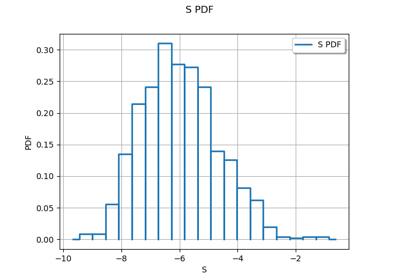FORMResult¶
- class FORMResult(*args)¶
Result of a FORM analysis.
- Parameters:
- designPointsequence of float
Design point in the standard space resulting from the optimization algorithm.
- limitStateVariable
RandomVector Event of which the probability is calculated.
- isInFailureSpacebool
Indicates whether the origin of the standard space is in the failure space.
Methods
Draw the sensitivities of the FORM failure probability.
Draw the sensitivity of the Hasofer Reliability Index.
drawImportanceFactors(*args)Draw the importance factors.
Accessor to the object's name.
Accessor to the failure probability
.
Accessor to the sensitivities of the FORM failure probability
.
Accessor to the Generalised Reliability Index.
Accessor to the Hasofer Reliability Index.
Accessor to the sensitivities of the Hasofer Reliability Index.
getImportanceFactors(*args)Accessor to the importance factors.
Accessor to know if the standard point origin is in the failure space.
Accessor to the event of which the probability is calculated.
Accessor to the mean point in the standard event domain.
getName()Accessor to the object's name.
Accessor to the result of the optimization problem.
Accessor to the design point in the physical space.
Accessor to the design point in the standard space.
hasName()Test if the object is named.
Accessor to specify if the standard point origin is in the failure space.
Accessor to the mean point in the standard event domain.
setName(name)Accessor to the object's name.
setOptimizationResult(optimizationResult)Accessor to the result of the optimization problem.
Accessor to the design point in the standard space.
See also
Notes
Structure created by the method run() of the
FORMclass and obtained thanks to its method getResult().- __init__(*args)¶
- drawEventProbabilitySensitivity(*args)¶
Draw the sensitivities of the FORM failure probability.
- Parameters:
- widthfloat, optional
Value to calculate the shift position of the
BarPlot. By default it is 1.0.
- Returns:
- graphCollectionlist of two
Graphcontaining a barplot The first graph drawing the sensitivities of the FORM failure probability with regards to the parameters of the probabilistic input vector. The second graph drawing the sensitivities of the FORM failure probability with regards to the parameters of the dependence structure of the probabilistic input vector.
- graphCollectionlist of two
- drawHasoferReliabilityIndexSensitivity(*args)¶
Draw the sensitivity of the Hasofer Reliability Index.
- Parameters:
- widthfloat, optional
Value to calculate the shift position of the
BarPlot. By default it is 1.0.
- Returns:
- graphCollectionsequence of two
Graphcontaining a barplot The first graph drawing the sensitivity of the Hasofer Reliability Index to the parameters of the marginals of the probabilistic input vector. The second graph drawing the sensitivity of the Hasofer Reliability Index to the parameters of the dependence structure of the probabilistic input vector.
- graphCollectionsequence of two
- drawImportanceFactors(*args)¶
Draw the importance factors.
- Parameters:
- typeint, optional
- Returns:
- graph
Graph Pie of the importance factors of the probabilistic variables.
- graph
- getClassName()¶
Accessor to the object’s name.
- Returns:
- class_namestr
The object class name (object.__class__.__name__).
- getEventProbability()¶
Accessor to the failure probability
.
- Returns:
- probabilitypositive float
The FORM failure probability
.
- getEventProbabilitySensitivity()¶
Accessor to the sensitivities of the FORM failure probability
.
- Returns:
- sensitivities
Point Sensitivities of the FORM failure probability with regards to the parameters of the probabilistic input vector and to parameters of the dependence structure of the probabilistic input vector.
- sensitivities
- getGeneralisedReliabilityIndex()¶
Accessor to the Generalised Reliability Index.
- Returns:
- indexfloat
Generalised reliability index
from the FORM failure probability is equal to
the Hasofer reliability index
according to the fact the standard space center fulfills the event or not.
- getHasoferReliabilityIndex()¶
Accessor to the Hasofer Reliability Index.
- Returns:
- indexfloat
Hasofer Reliability Index which is the distance of the design point from the origin of the standard space
.
- getHasoferReliabilityIndexSensitivity()¶
Accessor to the sensitivities of the Hasofer Reliability Index.
- Returns:
- sensitivity
PointWithDescription Sequence containing the sensitivities of the Hasofer Reliability Index to the parameters of the probabilistic input vector (marginals and dependence structure) with a description for each component.
- sensitivity
- getImportanceFactors(*args)¶
Accessor to the importance factors.
- Parameters:
- typeint, optional
When ot.AnalyticalResult.ELLIPTICAL, the importance factors are evaluated as the square of the co-factors of the design point in the elliptical space of the iso-probabilistic transformation (Y-space).
When ot.AnalyticalResult.CLASSICAL they are evaluated as the square of the co-factors of the design point in the U-space.
When ot.AnalyticalResult.PHYSICAL, the importance factors are evaluated as the square of the physical sensitivities.
By default type = ot.AnalyticalResult.ELLIPTICAL.
- Returns:
- factors
PointWithDescription Sequence containing the importance factors with a description for each component.
- factors
Notes
If the importance factors are evaluated as the square of the co-factors of the design point in the U-space :
If the importance factors are evaluated as the square of the co-factors of the design point in the Y-space :
where
with
is the design point in the physical space and
the univariate standard CDF of the elliptical space. In the case where the input distribution of
has an elliptical copula
, then
has the same type as
. In the case where the input distribution of
has a copula
which is not elliptical, then
where
is the CDF of the standard normal.
If the importance factors are evaluated as the square of the physical sensitivities :
where
- getIsStandardPointOriginInFailureSpace()¶
Accessor to know if the standard point origin is in the failure space.
- Returns:
- isInFailureSpacebool
Indicates whether the origin of the standard space is in the failure space.
- getLimitStateVariable()¶
Accessor to the event of which the probability is calculated.
- Returns:
- limitStateVariable
RandomVector Event of which the probability is calculated.
- limitStateVariable
- getMeanPointInStandardEventDomain()¶
Accessor to the mean point in the standard event domain.
- Returns:
- meanPoint
Point Mean point in the standrad event domain.
- meanPoint
Notes
This method is used in the context of the FORM approximation of the probability of an event. Let
denote the standard event domain.
In the standard space, the transformed random vector
follows a spherical distribution. All the univariate marginals are identical. Let
denote the CDF of any univariate marginal and
its PDF.
Let
denote the design point in the standard space and
the associated Hasofer-Lind reliability index.
By symmetry in the standard space, the mean point in the standard event domain is computed as follows:
- getName()¶
Accessor to the object’s name.
- Returns:
- namestr
The name of the object.
- getOptimizationResult()¶
Accessor to the result of the optimization problem.
- Returns:
- result
OptimizationResult Contains the design point in the standard space and information concerning the convergence of the optimization algorithm.
- result
- getPhysicalSpaceDesignPoint()¶
Accessor to the design point in the physical space.
- Returns:
- designPoint
Point Design point in the physical space resulting from the optimization algorithm.
- designPoint
- getStandardSpaceDesignPoint()¶
Accessor to the design point in the standard space.
- Returns:
- designPoint
Point Design point in the standard space resulting from the optimization algorithm.
- designPoint
- hasName()¶
Test if the object is named.
- Returns:
- hasNamebool
True if the name is not empty.
- setIsStandardPointOriginInFailureSpace(isStandardPointOriginInFailureSpace)¶
Accessor to specify if the standard point origin is in the failure space.
- Parameters:
- isInFailureSpacebool
Indicates whether the origin of the standard space is in the failure space.
- setMeanPointInStandardEventDomain(meanPointInStandardEventDomain)¶
Accessor to the mean point in the standard event domain.
- Parameters:
- meanPointsequence of float
The mean point of the standard space distribution restricted to the event domain.
- setName(name)¶
Accessor to the object’s name.
- Parameters:
- namestr
The name of the object.
- setOptimizationResult(optimizationResult)¶
Accessor to the result of the optimization problem.
- Parameters:
- result
OptimizationResult Contains the design point in the standard space and information concerning the convergence of the optimization algorithm.
- result
- setStandardSpaceDesignPoint(standardSpaceDesignPoint)¶
Accessor to the design point in the standard space.
- Parameters:
- designPointsequence of float
Design point in the standard space resulting from the optimization algorithm.
Examples using the class¶

Use the post-analytical importance sampling algorithm
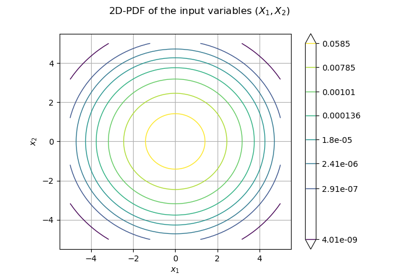
Use the FORM algorithm in case of several design points

Test the design point with the Strong Maximum Test
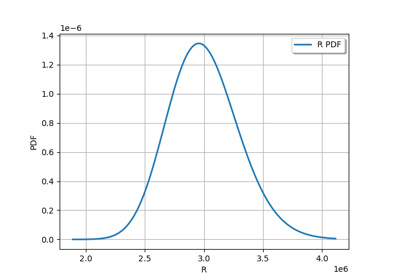
Axial stressed beam : comparing different methods to estimate a probability
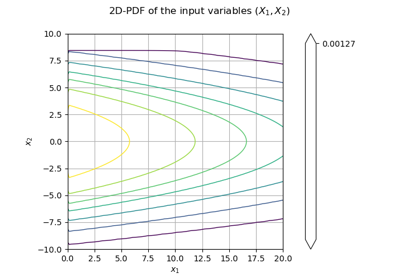
An illustrated example of a FORM probability estimate
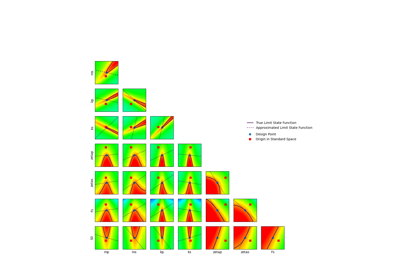
Using the FORM - SORM algorithms on a nonlinear function
 OpenTURNS
OpenTURNS
